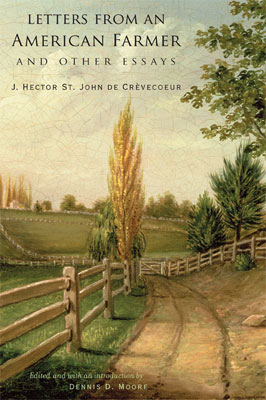 The recently released Letters from an American Farmer and Other Essays (Harvard UP, 2013) provides more depth and insight to French-born writer J. Hector St. John de Crèvecoeur and his reflections on early America, thanks to Dennis Moore's twenty-plus years of research. This updated reader's edition fits squarely in what Moore calls "a wonderful renaissance of scholarly interest in early America's history as well as its culture."
The recently released Letters from an American Farmer and Other Essays (Harvard UP, 2013) provides more depth and insight to French-born writer J. Hector St. John de Crèvecoeur and his reflections on early America, thanks to Dennis Moore's twenty-plus years of research. This updated reader's edition fits squarely in what Moore calls "a wonderful renaissance of scholarly interest in early America's history as well as its culture."
Scholars and the general public likely are aware of Crèvecoeur's 1782 essay "What is an American?" His description of what would become the US — "Here individuals of all nations are melted together into a new race of men" — established the notion that the newly formed country was a melting pot. The essay is at the heart of Letters from an American Farmer, a dozen fictional letters by the fictional character Farmer James that Crèvecoeur wrote, in English, while living the life of an American farmer. Moore points out, however, that if someone is not familiar with any of the other essays, "it's all too easy to blur Crèvecoeur the writer and Farmer James, his very, very naïve letter-writer."
In fact, the twelve essays in Letters are a little more than a third of writings Crèvecoeur composed, in English, during the twenty years he lived in what is now New York State. He returned to France just as the American Revolution was ending, and there he rewrote many of his essays in French. Parts of the collection ended up in print a century after his death—as the 1925 book Sketches of Eighteenth Century America and a few separate publications, including one in The Nation. In the mid-1980s, the Library of Congress purchased the entire collection of essays Crèvecoeur had written in English.
"As a Ph.D. student at Chapel Hill in the late '80s, I was fortunate to work with a distinguished scholar, Everett Emerson, who called those Crèvecoeur manuscripts at the Library of Congress to my attention," Moore says. "As my dissertation, I collected five of the pieces in that bundle that had still never appeared in print, providing literary and historical context that showed the ways they fit into his view of the world."
 Moore expanded that project in 1995 into the book More Letters from the American Farmer: An Edition of the Essays in English Left Unpublished by Crèvecoeur. As a scholarly edition, he says, "it includes Crèvecoeur's many strikethroughs and shows what he added in the margins and so on: while it saves the reader a trip to Washington to look at the original manuscript, it does not lend itself to use in many courses, except ones on editing."
Moore expanded that project in 1995 into the book More Letters from the American Farmer: An Edition of the Essays in English Left Unpublished by Crèvecoeur. As a scholarly edition, he says, "it includes Crèvecoeur's many strikethroughs and shows what he added in the margins and so on: while it saves the reader a trip to Washington to look at the original manuscript, it does not lend itself to use in many courses, except ones on editing."
Moore says he is gratified that fellow scholars of early American literature commonly cite More Letters when writing about Crèvecoeur. One of many ways to gauge the expanded interest in Crèvecoeur and the times in which he lived, Moore points out, is to see the flowering of the Society of Early Americanists, of which he is a past president, and of the interdisciplinary American Studies Association's Early American Matters Caucus, which he founded in 2004 and continues to lead.
When Moore proposed in 2003 to Harvard University Press "a new, more reliable edition" of Crèvecoeur's writings, "they agreed that placing Crèvecoeur's writings in a fuller context would require including not only the twelve texts that had appeared in the 1782 book Letters but also a comparable number of other essays he had written during the same period," Moore says. "All five of the previously unpublished pieces that had appeared in More Letters are in this new edition—as is a fresh, far more authoritative version of each essay that had appeared in print in the 1920s."
Moore's new edition of Crèvecoeur features an introduction and annotations that reflect major trends in recent scholarship. The result, writes distinguished scholar Ralph Bauer of the University of Maryland, author of The Cultural Geography of Colonial American Literatures: Empire, Travel, Modernity (Cambridge UP, 2003), "is a Crèvecoeur who is notable less for his provincial agrarianism and more for a cosmopolitanism that is deeply engaged with the global implications of the American hemisphere in world history and literature. Moore's introduction and edition are both scholastically impeccable and immensely readable, making this book useful for teaching and invaluable to scholarship."
Moore now turns his scholarly attention to two projects that build on his familiarity with Crèvecoeur. For Oxford University Press and its Oxford Bibliographies Online he is completing a detailed overview of scholarship on Crèvecoeur, and he is preparing a collection of theoretically informed essays, "The New Crèvecoeur."
